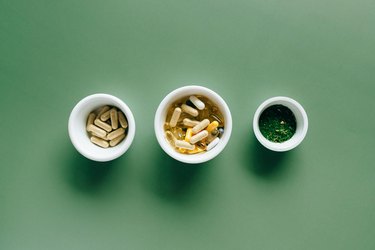
Zoloft, the brand name for the antidepressant medication sertraline, is a prescription medication used to treat depression, OCD, panic attacks, PTSD and other mental health conditions, according to the National Library of Medicine (NLM).
When you're navigating one of those conditions, it's common to search for home remedies that might improve your symptoms. Sometimes, people might take vitamins or herbal supplements alongside prescription medicines.
Video of the Day
Video of the Day
However, some herbs can interact with specific pharmaceuticals, increasing or decreasing the drug's efficacy and potentially leading to side effects. If you take Zoloft, you should stay away from certain herbs to avoid potentially harmful interactions.
How Zoloft Works
Zoloft belongs to a family of drugs called selective serotonin reuptake inhibitors, or SSRIs, per the NLM. That means it helps increase the amount of serotonin in the brain. Serotonin is an important chemical that helps regulate mood.
But many compounds — including vitamins and certain dietary supplements — can also affect the levels of serotonin in your brain. That's why there are certain herbs to avoid when you take Zoloft.
Zoloft Interactions With Herbs
You should always talk to a doctor about the over-the-counter vitamins and supplements you take, but especially when a doctor is prescribing you a new medication. If Zoloft is part of your regimen, you may need to avoid the following herbal remedies.
St. John's Wort
This yellow-flowered plant has been used in traditional European medicine for centuries, but recent research suggests it is more effective than a placebo at easing mild depression symptoms in the short term, according to the National Center for Complementary and Integrative Health (NCCIH).
But it shouldn't be taken with any antidepressants, especially those, like sertraline, that affect serotonin. St. John's Wort can make depression meds less effective and increase your risk of serotonin-related side effects, per the NCCIH.
These symptoms, which can include fever, agitation, heavy sweating and muscle spasms, are often called serotonin syndrome, which can be life-threatening, per the NLM.
Tryptophan
Often sold as an herbal supplement, tryptophan is a compound that is considered a precursor to serotonin, meaning your body uses tryptophan to make serotonin, per the FDA. You shouldn't take any serotonin precursors alongside Zoloft because it could result in too much serotonin in your body.
What About Ashwagandha?
Some people wonder if ashwagandha, an herbal remedy used in traditional Ayurvedic medicine for thousands of years, can enhance the effects of Zoloft. While more studies are needed to confirm the effectiveness and safety of this evergreen shrub, right now, it doesn't seem to have any negative interactions with any antidepressant medications, according to the NCCIH.
What About Rhodiola?
Similarly, this root is thought to have some beneficial effects for people with depression. In a small March 2015 Phytomedicine study, rhodiola was found to be less effective than sertraline at treating depression but caused fewer side effects. It's also safe to take with SSRIs and may even improve their effects, according to a small March 2020 study in the Journal of Effective Disorders.
Other Interactions With Zoloft
Herbs aren't the only compounds you may need to avoid or limit. Talk to your doctor about any medications you're taking. They may need to adjust your dose or watch you for side effects. Some medications that may cause problems, per the NLM, include:
- Anticoagulants or blood thinners
- Aspirin and other anti-inflammatory drugs
- Medications for anxiety
- Medications for irregular heartbeat
- Migraine medications
- Sedatives and sleeping pills
- Other antidepressants
- NLM: "Sertraline"
- NCCIH: "St. John's Wort"
- NLM: "Serotonin syndrome"
- FDA: "ZOLOFT (sertraline hydrochloride) Tablets and Oral Concentrate"
- NCCIH: "Ashwagandha"
- Phytomedicine: "Rhodiola rosea versus sertraline for major depressive disorder: A randomized placebo-controlled trial"
- Journal of Effective Disorders: "Antidepressants effects of Rhodiola capsule combined with sertraline for major depressive disorder: A randomized double-blind placebo-controlled clinical trial"